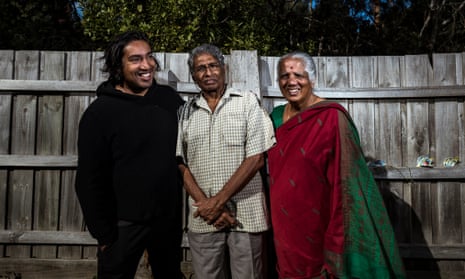More than 20 community groups are prepared to immediately begin privately sponsoring refugees to Australia should the federal government approve a new program modelled on a Canadian policy.
Some 42,000 people have signed a petition in support of the proposal and 40 councils and local governments are backing it.
Guardian Australia reported on Monday that the government was looking favourably at elements of a Canadian refugee sponsorship scheme in which private groups or community organisations cover the financial costs and settlement support for humanitarian entrants.
Canada’s program, established in the 1970s, has welcomed more than 300,000 refugees over four decades, in addition to the government’s resettlement schemes.
Australia’s immigration minister, Alex Hawke, told the Guardian he looked forward to “ensuring the program becomes a genuine, successful partnership between community, business and the government”.
Lisa Button, the executive director of the Australian Community Refugee Sponsorship Initiative, said she was encouraged that the government was seriously considering the Canadian model. She said a public call-out last year for volunteers to help resettle refugees had been overwhelmed with offers of help.
“We now have more than 20 local volunteer groups in metropolitan and regional communities around the country screened, trained and ready to start doing their bit if the government can put in place the necessary policy settings and a small amount of funding to support the national coordination of this effort,” Button said.
“These volunteer groups comprise almost 200 people and [their locations] range from north Queensland to southern Tasmania and have … already been working hard over the last six months helping refugee individuals and families, who arrived before the pandemic, find their feet in their new communities.”
Australia has had two community sponsorship programs, both of which have been regarded as poorly targeted and overly bureaucratic.
The current program, the Community Support Program, has been criticised for being small, expensive and restrictive. The program is limited to just 1,000 places a year and – at about $100,000 to sponsor a family of four, including an application fee alone of $19,000 – it is more than three times as costly as its Canadian equivalent. The program is available only to refugees aged between 18 and 50 years who have functional English and a job offer in Australia or skills that make them “job ready”.
As well – and most critically, according to advocates for reform – any refugees sponsored by the community are not additional to the government’s resettlement commitment, which was cut back to a near-historic low of 13,750 places in the last federal budget.
Instead, any community resettlement efforts subtract from the government’s responsibility: for every refugee resettled by a community group, the government resettles one fewer.
Government sources concede the current program is “broken”.
Canadian senator Ratna Omidvar, in Australia last month for the Philanthropy Australia conference, said: “Community sponsorship of refugees provides a powerful tool both for nation-building and social cohesion. It is a policy framework and practice that enables ordinary citizens to take the lead in helping refugees settle in a new country through the provision of financial, emotional and practical support.”
Shankar Kasynathan, a former refugee from Sri Lanka who was resettled in Australia as a three-year-old, has led Amnesty’s campaign to support and reform community sponsorship of refugees in Australia.
“There’s a bunch of us who know what community-led refugee resettlement can do,” he said. “It is so much more than a policy – it is literally a defining moment in a refugee’s life and their journey.”
Kasynathan said he had spent three and a half years meeting with governments and councils, community organisations and church and faith groups, “testing the appetite of communities to step up and participate”.
“Ultimately and critically, this model needs to be additional [to government-sponsored resettlement]. This program could transform resettlement in Australia, but for it to really be embraced by the greater Australian community, to be a shining light for Australia, it needs to be additional,” he said.
The Refugee Council of Australia first proposed a community sponsorship program – based on the Canadian model – to the then-Labor government in 2010.
“We’re very keen to see what the government is proposing,” the council’s chief executive, Paul Power, said. “There have been two quite unsuccessful attempts by governments at an Australian community sponsorship model and all they’ve succeeded in doing is placing a burden on refugee families to dip into their pocket for family reunion.
“A more effective community sponsorship must mobilise both refugee families, as well as a broader group of Australians, in supporting newly arrived refugees.”
Power said that “the willingness is there” within the Australian community.
“Operation Not Forgotten has raised $2.5m in Australia to support refugees from Nauru and Manus who have no practical resettlement option to be resettled in Canada,” he said. “I think there are many Australians who are aware of and deeply concerned about the situation faced by refugees, and if the sponsorship program is one where people are contributing to additional solutions for people, then the community will get behind it.”
The commonwealth coordinator general for migrant services, Alison Larkins, conducted a review of Australia’s current support arrangements and has submitted detailed recommendations to Hawke. The review follows a separate examination of Australia’s humanitarian program by the former senior bureaucrat Peter Shergold.
Hawke said in a statement to the Guardian he was a “strong supporter of the community support program”.
“I look forward to ensuring the program becomes a genuine, successful partnership between community, business and the government, to provide beneficial outcomes to our refugee and humanitarian arrivals in Australia,” the immigration minister said.
He said he intended to consider the report of the coordinator general in detail “and consider possible changes to our program which could strengthen our approach”.
